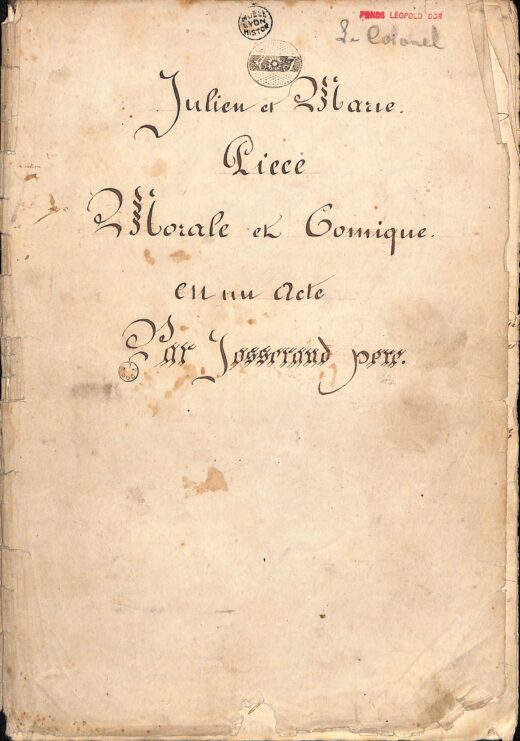
Manuscript
16 pages
Author(s)
Julien et Marie
This play is known to us only through a manuscript acquired in 1927 by collector Léopold Dor from puppeteer Joanny Durafour. This copy is stamped by the Rhône Prefecture, which was responsible for theatre censorship. The stamp is dated to the 1870s, but the play is older than that, as Josserand Sr. died in 1855.
The manuscript is now kept in the Léopold Dor Collection at the Musée des Arts de la Marionnette - Musée Gadagne in Lyon, France.
A father allows his daughter to marry for love.
The cook Pauline questions Guignol, a hussar, about the date of their wedding, as he has been courting her for a year. The colonel catches them and is displeased with Guignol. Guignol, in turn, reveals that he heard the colonel, while asleep, uttering vows of love to a certain Marie. Shortly afterwards, Amélie, the colonel's daughter, intervenes to ask why her piano teacher is absent.
Later, the colonel receives a visit from a countess who has come to ask him why her son, Amélie's piano teacher, has been dismissed, and informs him that he has fallen ill and is in danger of dying. The colonel explains that he decided to separate them because of their young age, to prevent them from falling in love with each other. The countess replies that it is too late, then recounts an episode from the colonel's life: twenty-two years earlier, when he was known as Julien, he and a young girl named Marie were in love. But Marie's father forced her to marry a count. Realising that the Countess is none other than Marie, the Colonel decides to allow Amélie and Marie's son to marry. He leaves with them to go to the young man's bedside.Guignol, after several unsuccessful attempts, kills a cat that was threatening to eat a canary in its cage. Before leaving, the colonel tells him and Pauline that they can marry when he returns and that he will take care of the dowry: he wants everyone around him to be happy.